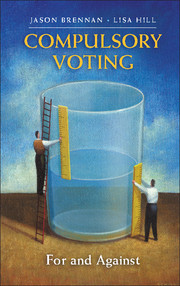2 - Democratic Legitimacy and the Consequences of Compulsion
Published online by Cambridge University Press: 05 June 2014
Summary
In this chapter, I examine and undermine two sets of arguments for compulsory voting. The first set of arguments concerns ideas about democratic legitimacy. The second set of arguments claims compulsory voting would produce good consequences.
The connection between these two sets of arguments is psychological. While none of the arguments I examine here are sound, the arguments in the first set are particularly flawed. However, many lay-people, journalists, politicians, and even some political theorists find this first set of arguments appealing. But they find these arguments appealing because they are confused. Arguments in the first set are really just confused, badly articulated versions of the arguments in the second set. For instance, some people say compulsory voting is necessary to ensure democratic legitimacy. However, probably no one who says that actually means that democracies without compulsory voting are illegitimate. Instead, she probably just intends to say that compulsory voting would make democracy more responsive to the needs of the poor.
Compulsory Voting and Government by Consent
Alfred Apps, former president of Canada’s Liberal Party, and I once debated compulsory voting. Apps probably supports compulsory voting because he believes it would benefit the Liberal Party. (However, during the debate, Apps admitted he had not read any empirical research on compulsory voting. In fact, the best available evidence indicates it does not help small parties.) But Apps is a cunning politician. He cannot say, “I advocate compulsory voting because I believe it would help me.”
- Type
- Chapter
- Information
- Compulsory VotingFor and Against, pp. 25 - 61Publisher: Cambridge University PressPrint publication year: 2014



